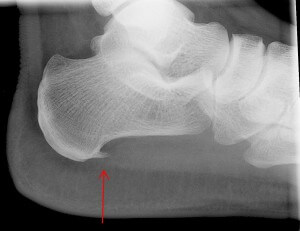Plantar fasciitis is one of the most common causes of heel pain. It involves pain and inflammation of a thick band of tissue, called the plantar fascia, which runs across the bottom of your foot — connecting your heel bone to your toes.
Plantar fasciitis causes stabbing pain that usually occurs with your very first steps in the morning. Once your foot limbers up, the pain of plantar fasciitis normally decreases, but it may return after long periods of standing or after getting up from a seated position.
Plantar fasciitis is particularly common in runners. People who are overweight, women who are pregnant and those who wear shoes with inadequate support are at a higher risk of plantar fasciitis.
In most cases, the pain associated with plantar fasciitis:
- Develops gradually
- Affects just one foot, although it can occur in both feet simultaneously
- Is worst with the first few steps after awakening, although it also can be triggered by long periods of standing or getting up from a seated position
- Feels like a sharp pain in the heel of your foot
Factors that may increase your risk of developing plantar fasciitis include:
- Age. Plantar fasciitis is most common between the ages of 40 and 60.
- Sex. Women are more likely than men to develop plantar fasciitis.
- Certain types of exercise. Activities that place a lot of stress on your heel and attached tissue — such as long-distance running, ballet dancing and dance aerobics — can contribute to an earlier onset of plantar fasciitis.
- Faulty foot mechanics. Being flat-footed, having a high arch or even having an abnormal pattern of walking can adversely affect the way weight is distributed when you’re standing, putting added stress on the plantar fascia.
- Obesity. Excess pounds put extra stress on your plantar fascia.
- Occupations that keep you on your feet. People with occupations that require a lot of walking or standing on hard surfaces — such as factory workers, teachers and waitresses — can damage their plantar fascia.
- Improper shoes. Shoes that are thin soled, loose, or lack arch support or the ability to absorb shock don’t protect your feet. If you regularly wear shoes with high heels, your Achilles tendon — which is attached to your heel — can contract and shorten, causing strain on the tissue around your heel.
Conservative therapy of plantar fasciitis consists of stretching, chiropractic adjustments of the foot, shoe inserts(orthotics), night splints, and taping. More invasive methods of treatment can be surgery, corticosteroids, NSAIDS, casting, and extracorporeal shock wave therapy.
Here at Emerald Coast Chiropractic, we have had great results with the conservative care of plantar fasciitis. Our treatment consists of adjustments, soft tissue manipulation, stretching, taping and custom made orthotics. Several area runners and other athletes have reaped the benefits from coming to see us.
Dr. Whidden is a former U.S. Navy pilot turned chiropractor in Destin, Florida. Emerald Coast Chiropractic, finding solutions to today’s health care issues, Who’s YOUR Chiropractor?
Ken Whidden, DC
Emerald Coast Chiropractic

